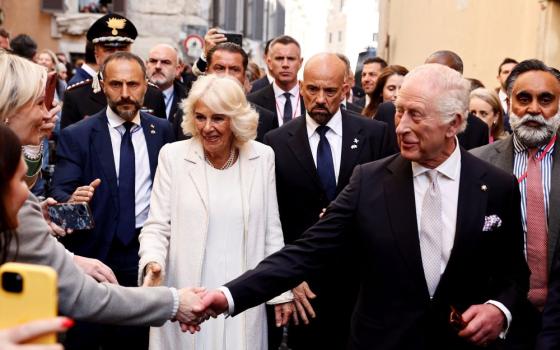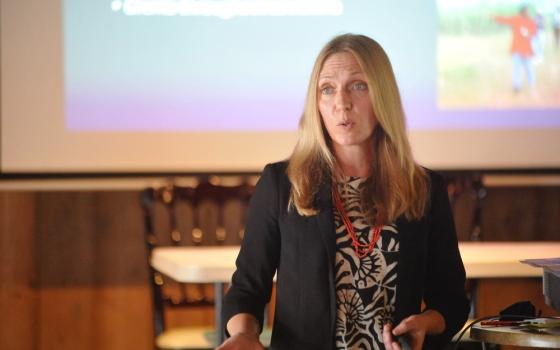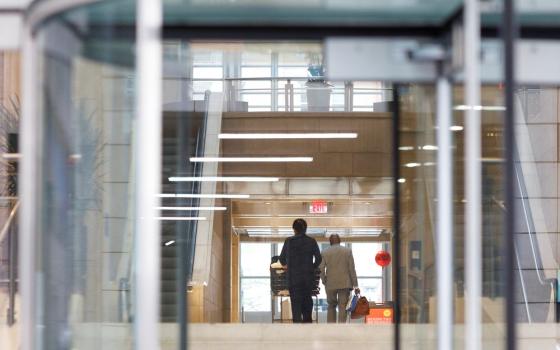
Bishop Liam Cary of Baker, Oregon, prays during Mass at the Basilica of St. Paul Outside the Walls in Rome Feb. 7, 2020. (CNS/Paul Haring)
The Vatican's document permitting blessings for those in "irregular situations," including same-sex relationships, has continued to spark controversy and varied responses from bishops around the world.
On Feb. 9, Bishop Liam Cary of Baker, Oregon, said he has asked the priests of his diocese "not to bless known cohabiting couples, of the same sex or both sexes" because he does not believe that blessings for couples in such situations could be carried out in a "scandal-free" manner in his diocese.
"If a cohabiting heterosexual couple or a same sex couple were to ask a priest to bless them, they would be seeking an official sign of approval for behavior that the Church teaches is sinful in God's sight," he wrote in a statement. "If the priest complies with their request, the subtle distinctions of Fiducia Supplicans will not keep bystanders from concluding that the Church the priest represents no longer believes as she always did before, but is now endorsing the unions of unmarried couples."
Cary began his statement by referencing a March 2021 response by Cardinal Luis Ladaria, then prefect of the former Congregation (now Dicastry) for the Doctrine of the Faith, now to a question about whether the church could bless unions of persons of the same sex. The Vatican said "no" at the time in a statement signed by Pope Francis.
Ladaria wrote that "it is not licit to impart a blessing on relationships ... that involve sexual activity outside of marriage," because such a blessing would effectively "approve and encourage a choice and a way of life that cannot be objectively ordered to the revealed plans of God." The cardinal added that "persons with homosexual inclinations" may be blessed as individuals if they "manifest the will to live in fidelity to the revealed plans of God as proposed by Church teaching."
Advertisement
Cary then addressed the Dec. 18 document "Fiducia Supplicans" ("Supplicating Trust") on "the pastoral meaning of blessings," issued by Cardinal Víctor Manuel Fernández, the current head of the Dicastery of the Doctrine of the Faith.
"In the years since the 2021 Response was issued, Cardinal Fernandez contends, the 'horizon' of Church teaching has undergone 'a real development,'" he wrote. "The new 'context' allows 'the possibility of blessing … same sex couples without officially validating their status or changing in any way the Church's perennial teaching on marriage.'"
The cardinal "earnestly" reaffirms, Cary said, that marriage between a man and a woman "is the uniquely blessed environment for sexual relations between human persons."
"Far from authorizing same-sex unions, therefore, the Declaration repeatedly cautions against 'the risk of confusing a blessing given to any other union with the Rite that is proper to the Sacrament of Marriage,'" he continued. "In fact, Cardinal Fernandez says, the new non-ritualized 'pastoral' blessings he proposes, should not be given if they will spread confusion about Catholic doctrine on marriage and sexual morality."
He noted that, despite this language, following the release of "Fiducia Supplicans," images of "pre-planned same-sex ceremonies filled computer screens around the globe" with priests giving blessings the document actually prohibited.
"Mass media quickly spread the news worldwide: the Catholic Church has changed her mind; she now approves of same-sex unions," he wrote.
In Africa, "what seemed to be papal authorization to bless homosexual couples stunned Evangelical and Pentecostal Christians, who had always counted on unflinching Catholic witness to the biblically based truth of marriage," he pointed out. "Africa's Muslims took critical note of the document too. So did the African bishops."
Cardinal Fridolin Ambongo of Kinshasa in Congo brought his concerns to Rome, which led to a statement "on behalf of the entire Catholic Church in Africa" with the agreement of Pope Francis, stating the bishops' belief that "the extra-liturgical blessings proposed in … 'Fiducia Supplicans' cannot be carried out in Africa without exposing themselves to scandals."
Cary agreed with the bishops of Africa regarding such blessings. "I do not believe they can be carried out scandal-free in the Diocese of Baker either," he wrote.
"In accord with Cardinal Fernandez's above-noted cautions about creating confusion and the statement of the African bishops, I ask priests of Baker not to bless known cohabiting couples, of the same sex or both sexes," he concluded. "Individual men and women, however, as Cardinal Fernandez and the African bishops agree, should feel free to request and should receive, a priestly blessing outside of Mass."




